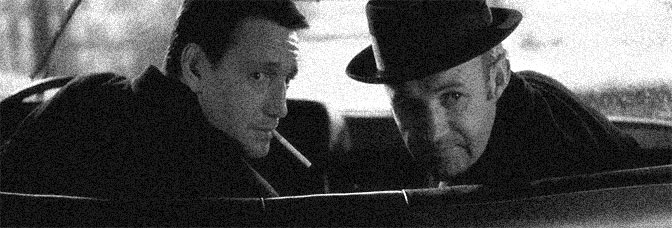The French Connection has a linear progression. No flashbacks, no flashforwards; it’s never implied two events are happening simultaneously. One thing happens after another. Only there’s nothing connecting those things, other than the actors, other than the cops’ investigation. Because French Connection unfolds for the viewer just like it does the cops. Or if the viewer has more information, it turns out to be pointless. Not so much a red herring as immaterial.
Eventually, it turns out a lot is immaterial in The French Connection. Director Friedkin doesn’t make an effort to misdirect the viewer, he just doesn’t provide the information.
The French Connection is about New York narcotics cops Gene Hackman and Roy Scheider trying to figure out how Tony Lo Bianco is dirty and what it has to do with Frenchman Fernando Rey. The viewer finds out about Rey in the first scene of the film–in fact, he’s the only one with ground situation character information–but it takes a while for Hackamnd and Scheider to discover him.
The film runs 104 minutes. Much of the second half takes place in the span of a week. Friedkin and screenwriter Ernest Tidyman only have three expository sequences. Two are traditional boss chewing out rogue cops scenes, the other is Scheider giving a surveillance report to Hackman. The audio is laid over shots of the scenes and characters in question. It’s breathtakingly efficient, especially since Hackman and Rey colliding will soon change the film. The somewhat large cast of characters is repeatedly introduced to ingrain. The angry boss scenes use different techniques to do different things, like reducing Scheider’s part while maintaining its presence (the solution is to give him more personality) and setting up Bill Hickman’s dipshit federal agent tagalong.
Simultaneous to this exquisite plotting is the filmmaking. Friedkin and the crew excel. Owen Roizman’s photography has this crisp chill to the police work but a heat to the “off duty” scenes and locations. Friedkin and editor Gerald B. Greenberg have some scenes where it’s just incidental noise, no sound for the dialogue. Or they’ll just cut fast to the next scene. Or they’ll just cut fast and jiggle the pacing of a scene; Hackman is in a car, gets out, but they cut it ahead, so Hackman’s walking into the shot before he’s done talking about getting out of the car. It’s a gallop. And it goes a long way for mood.
Then there are the performances. Scheider is fantastic, ably navigating his character shallowing out as the film progresses. Hackman’s reserved but bombastic, violative but sullen. He has an energy and Scheider’s got to keep up with and sometimes contain it (both as an actor working off another and to essay the script). Hackman and Scheider are a phenomenal pairing.
Hackman’s performance is captivating. He always has something else to reveal about the character, which keeps the police procedural even more interesting. Every action, every reaction–Hackman makes them impulsive but inevitable.
It’s juxtaposed against Rey, who never loses his cool. He also has to reconcile his character–a sauve, cultured, loving Frenchman who’s also an international drug dealer.
Marcel Bozzuffi’s terrifying as Rey’s flunky.
Good score from Don Ellis. It’s deceptive when it’s being obvious. It excites the viewer’s imagination, forcing their engagement with a particular scene or shot. Combined with Friedkin and Greenberg’s cuts, French Connection has occasionally has an uncanny feel without ever giving up its grounding.
The French Connection is a singular motion picture.
 ★★★★
★★★★
CREDITS
Directed by William Friedkin; screenplay by Ernest Tidyman, based on the book by Robin Moore; director of photography, Owen Roizman; edited by Gerald B. Greenberg; music by Don Ellis; produced by Philip D’Antoni; released by 20th Century Fox.
Starring Gene Hackman (Jimmy Doyle), Roy Scheider (Buddy Russo), Fernando Rey (Alain Charnier), Tony Lo Bianco (Sal Boca), Marcel Bozzuffi (Pierre Nicoli), Frédéric de Pasquale (Devereaux), Arlene Farber (Angie Boca), and Bill Hickman (Mulderig).
RELATED

Leave a Reply